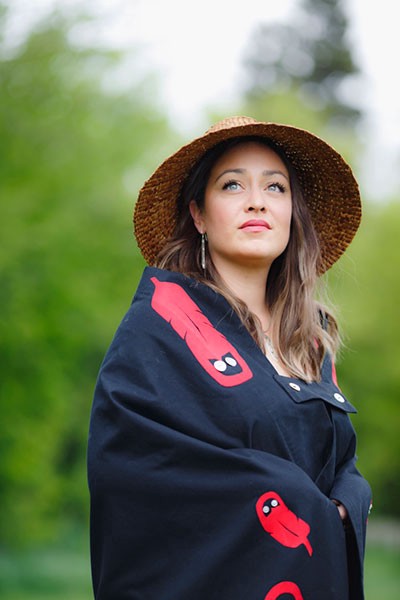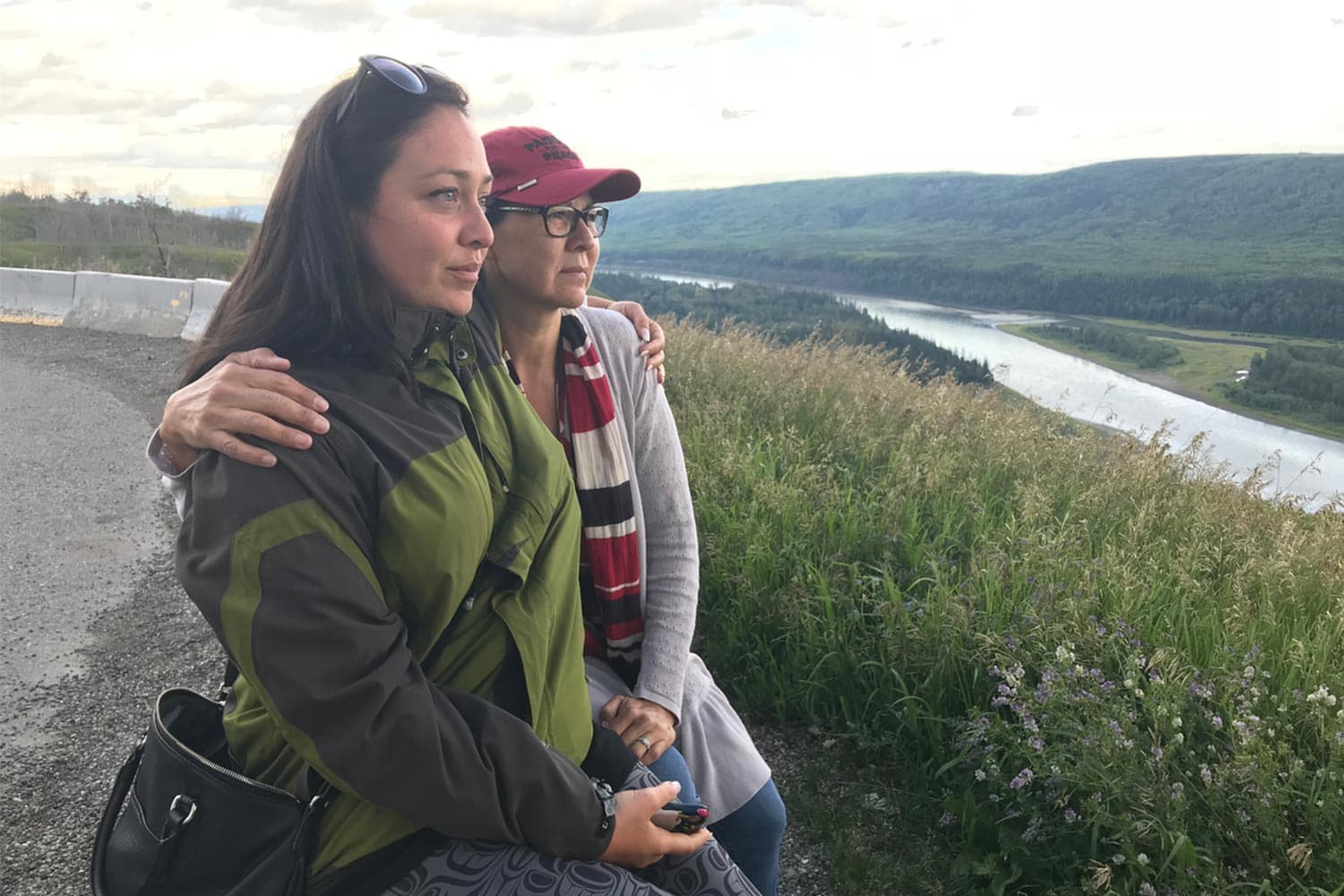The Story of Site C Took Time to Tell Right
Indigenous filmmaker Heather Hatch’s new documentary has been five years in the making.
Documentary director Heather Hatch (left) and anti-Site C activist Diane Abel look over the Peace River.
“The traffic is ridiculous. And the people that come to work here don’t understand or respect the territory as it is.” The young woman who speaks these words near the midpoint of the documentary Wochiigii lo: End of the Peace is a member of the West Moberly First Nation. She’s shown standing in the heart of the Peace River valley, with two children and two older family members, a man and a woman.
The people she’s speaking about are the construction workers building the Site C hydroelectric dam across the Peace. “They don’t understand the people,” she continues. “They don’t respect the land, and they go through it like it’s nothing.”
Site C is a hydroelectric project currently under construction 7 km southwest of Fort St. John, BC. It is scheduled for completion around 2025. The project was approved in 2014, but a coalition of First Nations and settler residents in the valley have continued fighting it in the courts and on the ground. Haida filmmaker Heather Hatch began documenting their efforts in 2016. Once in the community, she found that doing this story justice meant she had to take it slow. Five years slow, to be precise.
They don’t understand the people. They don’t respect the land, and they go through it like it’s nothing.
If completed, the Site C dam will flood over 55 square km of land at the bottom of the Peace Valley. Those protesting the project argue it would destroy local ecosystems, animal migration routes, sacred First Nations burial grounds, farmland, and fish stocks, and permanently harm Indigenous cultural identity.
They say these changes violate Treaty 8, in which the government of Canada guaranteed 39 First Nations (including those in the Peace) rights to hunt, trap, and fish on their traditional territories “as long as the sun shines, the grass grows and the river flows.” The activists’ objections aren’t hypothetical: the WAC Bennett dam built further upstream on the Peace had similar impacts when it was completed in the 1960s, and still impacts local First Nations today.
Provincial electric utility BC Hydro began engineering studies on Site C in 1971. In the 1980s the studies were presented to the BC Utilities Commission, which rejected the project in 1983. However, Site C was revived by former Premier Christy Clark, who promised to get the dam to a “point of no return” before her government was voted out (in 2017). Construction began on the dam in the summer of 2015, and the following year Hatch arrived to document activists’ ongoing efforts to get the dam cancelled.

Haida filmmaker Heather Hatch took five years to capture the depth of the story of the Site C dam and the activists fighting for its cancellation.
Hatch’s previous work has also focused on telling Indigenous stories. She wrote for the CBC’s Peace River Rising — a documentary short about violence against Indigenous women — and penned the pilot for The Girl Who Talks to the Moon, a CBC Children’s show featuring Haida language and culture. Wochiigii lo, which is screening as part of the 2022 DOXA Documentary Film Festival, is Hatch’s first feature.
“This documentary has been near to my heart for five years and this process has granted me the immense privilege of trusting relationships with members of West Moberly First Nations,” Hatch wrote in her Director’s Statement. “Through them, I learned the absolute importance of consultation ethics to the craft of truth telling.”
What took five years? Capturing the depth of the story she wanted to convey.
“I’ve been following the story on the ground since 2016,” Hatch said in an interview. “Just really getting to understand the story spiritually as well as… historically and intellectually. Who to talk to and where the information should come from, but also creating a bond between me and the main character.”
That main character is Diane Abel, the older woman in the family grouping mentioned above. The former executive director of the Treaty 8 Tribal Association, Abel is a mother and grandmother who is committed to resisting the construction of Site C. Throughout the film, Abel acts as the audience’s guide to the land she is fighting to protect for future generations.
In addition to Abel and her family members, the film features West Moberly First Nations Chief Roland Wilson, settler farmers Ken Boon and Esther Pedersen, and a diverse cast of community members and academics. Hatch said she felt a bond with many of the people whose voices are featured in the film.
“This is one of the upsides of working in the field,” she said. “Meeting all these incredible, beautiful, spiritual, artistic people.”
I’ve been following the story since 2016, just really getting to understand it spiritually, historically, and intellectually.
Hatch served as writer, director, and producer on the project. With a small budget, she said she had to pick people she felt understood the subject matter, and had a heart for it. “I also really wanted a strong female team.”
The long process has had the desired results, according to Hatch. After the film screened at the Toronto International Film Festival in 2021, she received the kind of feedback that means the most to her as a filmmaker. “A woman… just said that I had done a good job capturing [the characters in the film],” she said. “I had done justice for them.”
As for the documentary’s future, now that it’s out in the world “I hope it makes a change,” said Hatch. “I hope it changes somebody’s mind.”
Vancouver’s DOXA Documentary Film Festival runs from May 5–15, 2022. Wochiigii lo: End of the Peace (85 min, English) screens in person on May 11 at 6 pm, at the Djavad Mowafaghian Cinema, and on May 12 at 8:30 pm, at the VIFF Centre. It can also be screened virtually from anywhere in Canada throughout the festival. Tickets to in-person and online screenings are available on the DOXA website.
